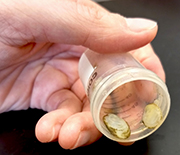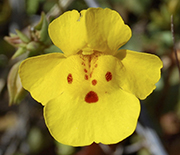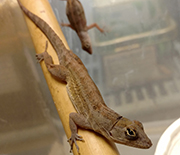News Release 18-069
NSF awards $10 million for development, dissemination of genomic tools in diverse species
Awards will help researchers determine the relationship between genes and their functions in organisms

View video
The Hawaiian bobtail squid makes for a good cephalopod model for building new genomic tools.
August 30, 2018
This material is available primarily for archival purposes. Telephone numbers or other contact information may be out of date; please see current contact information at media contacts.
The National Science Foundation's (NSF) Enabling Discovery through Genomic Tools (EDGE) program has made 11 new awards, totaling approximately $10 million, to develop genomic tools that will allow biologists to identify mechanisms that determine how genes affect an organism's physical and functional characteristics.
The EDGE program helps the research community overcome the impediments that restrict progress in the biology of organisms, including their structure, function and other traits. Specifically, EDGE supports the development and dissemination of new functional genomic tools, approaches and associated infrastructure to directly test gene function in organisms.
"The EDGE awards are very exciting because they are transformative," said Joanne Tornow, NSF's acting assistant director for the Directorate of Biological Sciences. "These researchers are creating innovative tools that will advance efforts to identify links between genes and complex organismal-level characteristics in a wide range of species."
EDGE awards cover a diverse range of organisms, from fungi to plants and animals. Each new project will move the scientific community closer to being able to predict phenotype by developing enhanced genomic tools and infrastructure. This research will contribute to elucidating the sets of rules that predict an organism's observable characteristics or phenotypes, helping to address one of NSF's 10 Big Ideas, "Understanding the Rules of Life."
"This research represents a grand challenge in biology and is part of a bigger effort within our field to better predict how organismal traits arise from genetic variation in natural environments," said Ted Morgan, NSF EDGE program director. "Building this fundamental understanding of how genetic changes are connected with organismal traits has a range of significant societal benefits that include predicting organismal responses to changing environments, the development of more effective conservation efforts, the development of new medical approaches, new therapeutics and better crop yields."
This year's awardees include:
Tools for studying gene function in voles
Zoe Donaldson, University of Colorado-Boulder
Genetic transformation of chytrid fungi
Lillian Fritz-Laylin, University of Massachusetts-Amherst
Generating tools to study Spiralian development
Jonathan Henry, University of Illinois at Urbana-Champaign
Establishing functional genomics in Hydra to study stem cells and regeneration
Celina Juliano, University of California-Davis
Expanding the functional genetics toolkit to link genes to phenotypes in cichlid fish
Scott Juntti, University of Maryland-College Park
Establishment of genome editing and transgenic tools in Anolis lizards
Douglas Menke, University of Georgia
High-efficiency identification of products of homologous recombination in plants as a tool to test gene function
Blake Meyers, Donald Danforth Plant Science Center
Developing techniques for linking genotype to phenotype in amphibians
Lauren O'Connell, Stanford University
Creation of genetically tractable cephalopod model using the Hawaiian bobtail squid
Joshua Rosenthal, Marine Biological Laboratory, Woods Hole
Enabling functional genomics in monkey flowers (Mimulus)
Andrea Sweigart, University of Georgia
Functional genomics in Polistes wasps, a model system in integrative organismal biology
Amy Toth, Iowa State University
-NSF-
-
NSF EDGE awardee Amy Toth holds a Polistes fuscatus wasp.
Credit and Larger Version -
Slipper snails will be used to develop an automated culture system to study other marine organisms.
Credit and Larger Version -
A monkey flower, studied for its diversity in form, physiology and life history.
Credit and Larger Version -
A brown anole lizard like this one will be used to study gene function and gene regulation.
Credit and Larger Version
Media Contacts
Ivy F. Kupec, NSF, (703) 292-8796, email: ikupec@nsf.gov
The U.S. National Science Foundation propels the nation forward by advancing fundamental research in all fields of science and engineering. NSF supports research and people by providing facilities, instruments and funding to support their ingenuity and sustain the U.S. as a global leader in research and innovation. With a fiscal year 2023 budget of $9.5 billion, NSF funds reach all 50 states through grants to nearly 2,000 colleges, universities and institutions. Each year, NSF receives more than 40,000 competitive proposals and makes about 11,000 new awards. Those awards include support for cooperative research with industry, Arctic and Antarctic research and operations, and U.S. participation in international scientific efforts.
Connect with us online
NSF website: nsf.gov
NSF News: nsf.gov/news
For News Media: nsf.gov/news/newsroom
Statistics: nsf.gov/statistics/
Awards database: nsf.gov/awardsearch/
Follow us on social
Twitter: twitter.com/NSF
Facebook: facebook.com/US.NSF
Instagram: instagram.com/nsfgov




